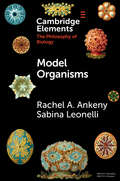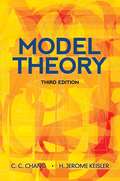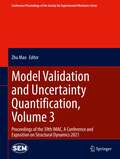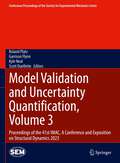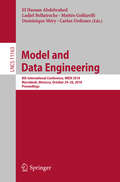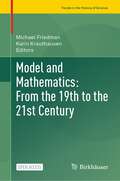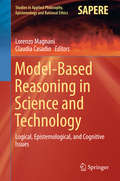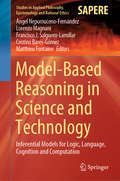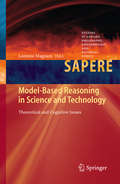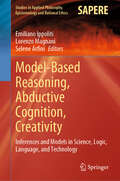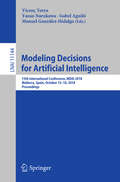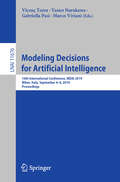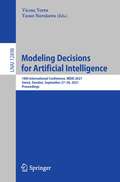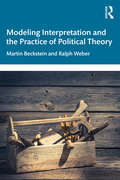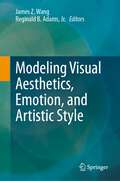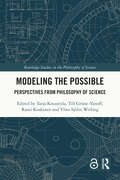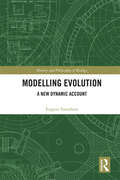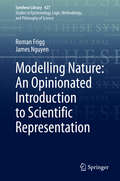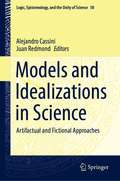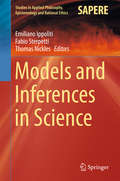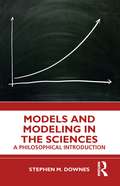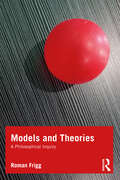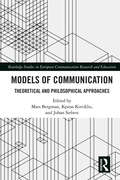- Table View
- List View
Model Organisms (Elements in the Philosophy of Biology)
by Sabina Leonelli Rachel AnkenyThis Element presents a philosophical exploration of the concept of the 'model organism' in contemporary biology. Thinking about model organisms enables us to examine how living organisms have been brought into the laboratory and used to gain a better understanding of biology, and to explore the research practices, commitments, and norms underlying this understanding. We contend that model organisms are key components of a distinctive way of doing research. We focus on what makes model organisms an important type of model, and how the use of these models has shaped biological knowledge, including how model organisms represent, how they are used as tools for intervention, and how the representational commitments linked to their use as models affect the research practices associated with them.
Model Theory and the Philosophy of Mathematical Practice: Formalization without Foundationalism
by John T. BaldwinMajor shifts in the field of model theory in the twentieth century have seen the development of new tools, methods, and motivations for mathematicians and philosophers. In this book, John T. Baldwin places the revolution in its historical context from the ancient Greeks to the last century, argues for local rather than global foundations for mathematics, and provides philosophical viewpoints on the importance of modern model theory for both understanding and undertaking mathematical practice. The volume also addresses the impact of model theory on contemporary algebraic geometry, number theory, combinatorics, and differential equations. This comprehensive and detailed book will interest logicians and mathematicians as well as those working on the history and philosophy of mathematics. Explains the philosophical significance of the transformation in model theory and its impact on traditional mathematics; The technical logic is grounded in historical and philosophical contexts, making the subject accessible to philosophers as well as mathematicians; Includes source materials from model theorists discussing their methods and motivation.
Model Theory: Third Edition (Dover Books on Mathematics #58)
by H. Jerome Keisler C. C. ChangModel theory deals with a branch of mathematical logic showing connections between a formal language and its interpretations or models. This is the first and most successful textbook in logical model theory. Extensively updated and corrected in 1990 to accommodate developments in model theoretic methods -- including classification theory and nonstandard analysis -- the third edition added entirely new sections, exercises, and references. Each chapter introduces an individual method and discusses specific applications. Basic methods of constructing models include constants, elementary chains, Skolem functions, indiscernibles, ultraproducts, and special models. The final chapters present more advanced topics that feature a combination of several methods. This classic treatment covers most aspects of first-order model theory and many of its applications to algebra and set theory.
Model Validation and Uncertainty Quantification, Volume 3: Proceedings of the 39th IMAC, A Conference and Exposition on Structural Dynamics 2021 (Conference Proceedings of the Society for Experimental Mechanics Series)
by Zhu MaoModel Validation and Uncertainty Quantification, Volume 3: Proceedings of the 39th IMAC, A Conference and Exposition on Structural Dynamics, 2021, the third volume of nine from the Conference brings together contributions to this important area of research and engineering. The collection presents early findings and case studies on fundamental and applied aspects of Model Validation and Uncertainty Quantification, including papers on:Inverse Problems and Uncertainty QuantificationControlling UncertaintyValidation of Models for Operating EnvironmentsModel Validation & Uncertainty Quantification: Decision MakingUncertainty Quantification in Structural DynamicsUncertainty in Early Stage DesignComputational and Uncertainty Quantification Tools
Model Validation and Uncertainty Quantification, Volume 3: Proceedings of the 41st IMAC, A Conference and Exposition on Structural Dynamics 2023 (Conference Proceedings of the Society for Experimental Mechanics Series)
by Roland Platz Garrison Flynn Kyle Neal Scott OuelletteModel Validation and Uncertainty Quantification, Volume 3: Proceedings of the 41st IMAC, A Conference and Exposition on Structural Dynamics, 2023, the third volume of ten from the Conference brings together contributions to this important area of research and engineering. The collection presents early findings and case studies on fundamental and applied aspects of Model Validation and Uncertainty Quantification, including papers on:Introduction of Uncertainty QuantificationUncertainty Quantification in DynamicsModel Form Uncertainty and Selection incl. Round Robin ChallengeSensor and Information FusionVirtual Sensing, Certification, and Real-Time MonitoringSurrogate Modeling
Model and Data Engineering: 8th International Conference, MEDI 2018, Marrakesh, Morocco, October 24–26, 2018, Proceedings (Lecture Notes in Computer Science #11163)
by Ladjel Bellatreche Carlos Ordonez El Hassan Abdelwahed Mattéo Golfarelli Dominique MéryThis book constitutes the refereed proceedings of the 8h International Conference on Model and Data Engineering, MEDI 2018, held in Marrakesh, Morocco, in October 2018.The 23 full papers and 4 short papers presented together with 2 invited talks were carefully reviewed and selected from 86 submissions. The papers covered the recent and relevant topics in the areas of databases; ontology and model-driven engineering; data fusion, classsification and learning; communication and information technologies; safety and security; algorithms and text processing; and specification, verification and validation.
Model and Mathematics: From the 19th to the 21st Century (Trends in the History of Science)
by Michael Friedman Karin KrauthausenThis open access book collects the historical and medial perspectives of a systematic and epistemological analysis of the complicated, multifaceted relationship between model and mathematics, ranging from, for example, the physical mathematical models of the 19th century to the simulation and digital modelling of the 21st century. The aim of this anthology is to showcase the status of the mathematical model between abstraction and realization, presentation and representation, what is modeled and what models.This book is open access under a CC BY 4.0 license.
Model-Based Reasoning in Science and Technology
by Lorenzo Magnani Claudia CasadioThis book discusses how scientific and other types of cognition make use of models, abduction, and explanatory reasoning in order to produce important or creative changes in theories and concepts. It includes revised contributions presented during the international conference on Model-Based Reasoning (MBR'015), held on June 25-27 in Sestri Levante, Italy. The book is divided into three main parts, the first of which focuses on models, reasoning and representation. It highlights key theoretical concepts from an applied perspective, addressing issues concerning information visualization, experimental methods and design. The second part goes a step further, examining abduction, problem solving and reasoning. The respective contributions analyze different types of reasoning, discussing various concepts of inference and creativity and their relationship with experimental data. In turn, the third part reports on a number of historical, epistemological and technological issues. By analyzing possible contradictions in modern research and describing representative case studies in experimental research, this part aims at fostering new discussions and stimulating new ideas. All in all, the book provides researchers and graduate students in the field of applied philosophy, epistemology, cognitive science and artificial intelligence alike with an authoritative snapshot of current theories and applications of model-based reasoning.
Model-Based Reasoning in Science and Technology: Inferential Models for Logic, Language, Cognition and Computation (Studies in Applied Philosophy, Epistemology and Rational Ethics #49)
by Lorenzo Magnani Ángel Nepomuceno-Fernández Francisco J. Salguero-Lamillar Cristina Barés-Gómez Matthieu FontaineThis book discusses how scientific and other types of cognition make use of models, abduction, and explanatory reasoning in order to produce important and innovative changes in theories and concepts. Gathering revised contributions presented at the international conference on Model-Based Reasoning (MBR18), held on October 24–26 2018 in Seville, Spain, the book is divided into three main parts. The first focuses on models, reasoning, and representation. It highlights key theoretical concepts from an applied perspective, and addresses issues concerning information visualization, experimental methods, and design. The second part goes a step further, examining abduction, problem solving, and reasoning. The respective papers assess different types of reasoning, and discuss various concepts of inference and creativity and their relationship with experimental data. In turn, the third part reports on a number of epistemological and technological issues. By analyzing possible contradictions in modern research and describing representative case studies, this part is intended to foster new discussions and stimulate new ideas. All in all, the book provides researchers and graduate students in the fields of applied philosophy, epistemology, cognitive science, and artificial intelligence alike with an authoritative snapshot of the latest theories and applications of model-based reasoning.
Model-Based Reasoning in Science and Technology: Theoretical and Cognitive Issues
by Lorenzo MagnaniThis book contains contributions presented during the international conference on Model-Based Reasoning (MBR´012), held on June 21-23 in Sestri Levante, Italy. Interdisciplinary researchers discuss in this volume how scientific cognition and other kinds of cognition make use of models, abduction, and explanatory reasoning in order to produce important or creative changes in theories and concepts. Some of the contributions analyzed the problem of model-based reasoning in technology and stressed the issues of scientific and technological innovation. The book is divided in three main parts: models, mental models, representations; abduction, problem solving and practical reasoning; historical, epistemological and technological issues. The volume is based on the papers that were presented at the international
Model-Based Reasoning, Abductive Cognition, Creativity: Inferences and Models in Science, Logic, Language, and Technology (Studies in Applied Philosophy, Epistemology and Rational Ethics #70)
by Emiliano Ippoliti Lorenzo Magnani Selene ArfiniThis book discusses how scientific and other types of cognition make use of models, abduction, and explanatory reasoning in order to produce important, innovative, and possibly creative changes in theories and concepts. Gathering revised contributions presented at the international conference on Model-Based Reasoning (MBR023), held on June 7–9, 2023 in Rome, Italy, the book addresses various intertwined topics ranging from the epistemology and applications of models also concerning the problem of knowledge production and scientific methodology (information visualization, experimental methods, and design) to the analysis of their role in cognition, decision-making, also with respect to social implications. The problem of model-based cognition is also illustrated taking advantage of recent results regarding problem-solving, abduction, and logic, paying attention to a critique of the dominant and received approaches, to the aim of fostering new discussions and stimulate new ideas. All in all, the book provides researchers and graduate students in the fields of applied philosophy, epistemology, cognitive science, and artificial intelligence alike with an authoritative snapshot of the latest theories and applications of model-based reasoning.
Modeling Decisions for Artificial Intelligence: 15th International Conference, MDAI 2018, Mallorca, Spain, October 15–18, 2018, Proceedings (Lecture Notes in Computer Science #11144)
by Vicenç Torra Yasuo Narukawa Isabel Aguiló Manuel González-HidalgoThis book constitutes the proceedings of the 15th International Conference on Modeling Decisions for Artificial Intelligence, MDAI 2018, held in Mallorca, Spain, in October 2018.The 24 papers presented in this volume were carefully reviewed and selected from 43 submissions. The book also contains one invited talk in full paper length. The papers were organized in topical sections named: aggregation operators, fuzzy measures and integrals; decision making; clustering and classification; and data privacy and security.
Modeling Decisions for Artificial Intelligence: 16th International Conference, MDAI 2019, Milan, Italy, September 4–6, 2019, Proceedings (Lecture Notes in Computer Science #11676)
by Vicenç Torra Yasuo Narukawa Gabriella Pasi Marco VivianiThis book constitutes the refereed proceedings of the 16th International Conference on Modeling Decisions for Artificial Intelligence, MDAI 2019, held in Milan, Italy, in September 2019. The 30 papers presented in this volume were carefully reviewed and selected from 50 submissions. They discuss different facets of decision processes in a broad sense and present research in data science, data privacy, aggregation functions, human decision making, graphs and social networks, and recommendation and search. The papers are organized in the following topical sections: aggregation operators and decision making; data science and data mining; and data privacy and security.
Modeling Decisions for Artificial Intelligence: 18th International Conference, MDAI 2021, Umeå, Sweden, September 27–30, 2021, Proceedings (Lecture Notes in Computer Science #12898)
by Vicenç Torra Yasuo NarukawaThis book constitutes the refereed proceedings of the 18th International Conference on Modeling Decisions for Artificial Intelligence, MDAI 2021, held in Umeå, Sweden, in September 2021.* The 24 papers presented in this volume were carefully reviewed and selected from 50 submissions. Additionally, 3 invited papers were included. The papers discuss different facets of decision processes in a broad sense and present research in data science, data privacy, aggregation functions, human decision making, graphs and social networks, and recommendation and search. The papers are organized in the following topical sections: aggregation operators and decision making; approximate reasoning; machine learning; data science and data privacy. *The conference was held virtually due to the COVID-19 pandemic.
Modeling Interpretation and the Practice of Political Theory
by Ralph Weber Martin BecksteinPolitical theory offers a great variety of interpretive traditions and models. Today, pluralism is the paradigm. But are all approaches equally useful? What are their limits and possibilities? Can we practice them in isolation, or can we combine them? Modeling Interpretation and the Practice of Political Theory addresses these questions in a refreshing and hands- on manner. It not only models in the abstract, but also tests in practice eight basic schemes of interpretation with which any ambitious reader of political texts should already be familiar. Comprehensive and engaging, the book includes: A straightforward typology of interpretation in political theory. Chapters on the analytical Oxford model, biographical and oeuvre- based interpretation, Skinner’s Cambridge School, the esoteric model, reflexive hermeneutics, reception analysis and conceptual history. Original readings of Federalist Paper No. 10 , Plato’s Statesman, de Gouges’s The Three Urns, Rivera’s wall painting The History of Mexico and Strauss’s Persecution and the Art of Writing; with further chapters on Machiavelli, Huang Zongxi and a Hittite loyalty oath. An Epilogue proposing pragmatist eclecticism as the way forward in interpretation. An inspiring, hands- on textbook suitable for undergraduate and graduate students, as well as experienced scholars of political theory, intellectual history and philosophy interested in learning more about types and models of interpretation, and the challenge of combining them in interpretive practice.
Modeling Visual Aesthetics, Emotion, and Artistic Style
by James Z. Wang Reginald B. Adams Jr.Modeling Visual Aesthetics, Emotion, and Artistic Style offers a comprehensive exploration of the increasingly significant topic of the complex interplay between human perception and digital technology. It embodies the cumulative knowledge and efforts of a wide array of active researchers and practitioners from diverse fields including computer vision, affective computing, robotics, psychology, data mining, machine learning, art history, and movement analysis. This volume seeks to address the profound and challenging research questions related to the computational modeling and analysis of visual aesthetics, emotions, and artistic style, vital components of the human experience that are increasingly relevant in our digitally connected world. The book's vast scope encompasses a broad range of topics. The initial chapters lay a strong foundation with background knowledge on emotion models and machine learning, which then transitions into exploring social visual perception in humans and its technological applications. Readers will uncover the psychological and neurological foundations of social and emotional perception from faces and bodies. Subsequent sections broaden this understanding to include technology's role in detecting discrete and subtle emotional expressions, examining facial neutrality, and including research contexts that involve children as well as adults. Furthermore, the book illuminates the dynamic intersection of art and technology, the language of photography, the relationship between breath-driven robotic performances and human dance, and the application of machine learning in analyzing artistic styles. This book sets itself apart with its unique multidisciplinary approach, encouraging collaboration across related domains. Packed with comprehensive tutorials, theoretical reviews, novel methodologies, empirical investigations, and comparative analyses, the book offers a rich combination of knowledge and methodologies. The book's focus on cutting-edge research not only presents the latest developments in the field but also illuminates potential paths that can lead to significant advancements in computer and robotic applications.
Modeling and Reasoning with Bayesian Networks
by Adnan DarwicheThis 2009 book is a thorough introduction to the formal foundations and practical applications of Bayesian networks. It provides an extensive discussion of techniques for building Bayesian networks that model real-world situations, including techniques for synthesizing models from design, learning models from data, and debugging models using sensitivity analysis. It also treats exact and approximate inference algorithms at both theoretical and practical levels. The treatment of exact algorithms covers the main inference paradigms based on elimination and conditioning and includes advanced methods for compiling Bayesian networks, time-space tradeoffs, and exploiting local structure of massively connected networks. The treatment of approximate algorithms covers the main inference paradigms based on sampling and optimization and includes influential algorithms such as importance sampling, MCMC, and belief propagation. The author assumes very little background on the covered subjects, supplying in-depth discussions for theoretically inclined readers and enough practical details to provide an algorithmic cookbook for the system developer.
Modeling the Possible: Perspectives from Philosophy of Science (Routledge Studies in the Philosophy of Science)
by Till Grüne-Yanoff Tarja Knuuttila Rami Koskinen Ylwa Sjölin WirlingModels are used to explore possibilities across all scientific fields. Climate models simulate the potential future climatic conditions under various emissions scenarios, macroeconomic models investigate the implications of various fiscal and monetary policy initiatives, and infectious diseases models study the spread of viral diseases under a range of conditions. Such modeling approaches have not gone ignored by philosophers of science, but they have only recently started to explicitly address modeling the possible. So far, the discussion has been spread across a variety of more or less isolated pockets of debate in the philosophy of science. Modeling the Possible: Perspectives from Philosophy of Science draws together these studies, focusing specifically on how various modeling practices probe possibilities and justify claims concerning them.The volume is divided into three sections, plus an introductory chapter. The introductory chapter provides a state-of-the-art survey of the discussions of modeling possibilities within the philosophy of science, as well as an introduction to the book’s main themes and individual papers. The three sections focus on different kinds of possibility concepts, possibility spaces, and how-possibly modeling in practical situations. The chapters contained in this volume address conceptual and theoretical issues while also presenting case studies from various scientific domains: physics, evolutionary and synthetic biology, network science, climate science, economics, and epidemiology.Essential reading for philosophers of science, epistemologists, and modelers in various scientific disciplines, Modeling the Possible is also suitable for anyone interested in model-based scientific inferences, their validity, and the policy conclusions derived from them.
Modelling Evolution: A New Dynamic Account (History and Philosophy of Biology)
by Eugene Earnshaw-WhyteEvolution by natural selection explains the tree of life and the complex adaptations found throughout nature. The power and versatility of evolutionary explanations have proved tempting to scientists outside of biology, but adapting evolutionary concepts to new domains has been challenging. Even within biology, there are many difficult questions and problem cases that face evolutionary theory. Modelling Evolution offers a new, general account of evolution by natural selection that identifies the essential features of evolutionary models that transcend any particular discipline. Evolution by natural selection in its broad sense is the systemic advantage of a type, in contrast to the narrow definition using heritable variation in fitness. This account is explained, contextualised and applied to a variety of questions in both biology and the social sciences. Offering an accessible and comprehensive account of evolution that is applicable both to biology and the broader social sciences, Modelling Evolution will appeal to students and researchers interested in fields such as biology, economics, sociology, history, and psychology.
Modelling Nature: An Opinionated Introduction to Scientific Representation (Synthese Library #427)
by Roman Frigg James NguyenThis monograph offers a critical introduction to current theories of how scientific models represent their target systems. Representation is important because it allows scientists to study a model to discover features of reality. The authors provide a map of the conceptual landscape surrounding the issue of scientific representation, arguing that it consists of multiple intertwined problems. They provide an encyclopaedic overview of existing attempts to answer these questions, and they assess their strengths and weaknesses. The book also presents a comprehensive statement of their alternative proposal, the DEKI account of representation, which they have developed over the last few years. They show how the account works in the case of material as well as non-material models; how it accommodates the use of mathematics in scientific modelling; and how it sheds light on the relation between representation in science and art. The issue of representation has generated a sizeable literature, which has been growing fast in particular over the last decade. This makes it hard for novices to get a handle on the topic because so far there is no book-length introduction that would guide them through the discussion. Likewise, researchers may require a comprehensive review that they can refer to for critical evaluations. This book meets the needs of both groups.
Models and Idealizations in Science: Artifactual and Fictional Approaches (Logic, Epistemology, and the Unity of Science #50)
by Juan Redmond Alejandro CassiniThis book provides both an introduction to the philosophy of scientific modeling and a contribution to the discussion and clarification of two recent philosophical conceptions of models: artifactualism and fictionalism. These can be viewed as different stances concerning the standard representationalist account of scientific models. By better understanding these two alternative views, readers will gain a deeper insight into what a model is as well as how models function in different sciences.Fictionalism has been a traditional epistemological stance related to antirealist construals of laws and theories, such as instrumentalism and inferentialism. By contrast, the more recent fictional view of models holds that scientific models must be conceived of as the same kind of entities as literary characters and places. This approach is essentially an answer to the ontological question concerning the nature of models, which in principle is not incompatible with a representationalist account of the function of models. The artifactual view of models is an approach according to which scientific models are epistemic artifacts, whose main function is not to represent the phenomena but rather to provide epistemic access to them. It can be conceived of as a non-representationalist and pragmatic account of modeling, which does not intend to focus on the ontology of models but rather on the ways they are built and used for different purposes. The different essays address questions such as the artifactual view of idealization, the use of information theory to elucidate the concepts of abstraction and idealization, the deidealization of models, the nature of scientific fictions, the structural account of representation and the ontological status of structures, the role of surrogative reasoning with models, and the use of models for explaining and predicting physical phenomena.
Models and Inferences in Science
by Emiliano Ippoliti Thomas Nickles Fabio SterpettiThe book answers long-standing questions on scientific modeling andinference across multiple perspectives and disciplines, including logic,mathematics, physics and medicine. The different chapters cover a variety ofissues, such as the role models play in scientific practice; the way scienceshapes our concept of models; ways of modeling the pursuit of scientificknowledge; the relationship between our concept of models and our concept ofscience. The book also discusses models and scientific explanations; models inthe semantic view of theories; the applicability of mathematical models to thereal world and their effectiveness; the links between models and inferences;and models as a means for acquiring new knowledge. It analyzes differentexamples of models in physics, biology, mathematics and engineering. Writtenfor researchers and graduate students, it provides a cross-disciplinaryreference guide to the notion and the use of models and inferences in science.
Models and Modeling in the Sciences: A Philosophical Introduction
by Stephen M. DownesBiologists, climate scientists, and economists all rely on models to move their work forward. In this book, Stephen M. Downes explores the use of models in these and other fields to introduce readers to the various philosophical issues that arise in scientific modeling. Readers learn that paying attention to models plays a crucial role in appraising scientific work. This book first presents a wide range of models from a number of different scientific disciplines. After assembling some illustrative examples, Downes demonstrates how models shed light on many perennial issues in philosophy of science and in philosophy in general. Reviewing the range of views on how models represent their targets introduces readers to the key issues in debates on representation, not only in science but in the arts as well. Also, standard epistemological questions are cast in new and interesting ways when readers confront the question, "What makes for a good (or bad) model?" All examples from the sciences and positions in the philosophy of science are presented in an accessible manner. The book is suitable for undergraduates with minimal experience in philosophy and an introductory undergraduate experience in science. Key features: The book serves as a highly accessible philosophical introduction to models and modeling in the sciences, presenting all philosophical and scientific issues in a nontechnical manner. Students and other readers learn to practice philosophy of science by starting with clear examples taken directly from the sciences. While not comprehensive, this book introduces the reader to a wide range of views on key issues in the philosophy of science.
Models and Theories: A Philosophical Inquiry
by Roman FriggModels and theories are of central importance in science, and scientists spend substantial amounts of time building, testing, comparing and revising models and theories. It is therefore not surprising that the nature of scientific models and theories has been a widely debated topic within the philosophy of science for many years. The product of two decades of research, this book provides an accessible yet critical introduction to the debates about models and theories within analytical philosophy of science since the 1920s. Roman Frigg surveys and discusses key topics and questions, including: What are theories? What are models? And how do models and theories relate to each other? The linguistic view of theories (also known as the syntactic view of theories), covering different articulations of the view, its use of models, the theory-observation divide and the theory-ladenness of observation, and the meaning of theoretical terms. The model-theoretical view of theories (also known as the semantic view of theories), covering its analysis of the model-world relationship, the internal structure of a theory, and the ontology of models. Scientific representation, discussing analogy, idealisation and different accounts of representation. Modelling in scientific practice, examining how models relate to theories and what models are, classifying different kinds of models, and investigating how robustness analysis, perspectivism, and approaches committed to uncertainty-management deal with multi-model situations. Models and Theories is the first comprehensive book-length treatment of the topic, making it essential reading for advanced undergraduates, researchers, and professional philosophers working in philosophy of science and philosophy of technology. It will also be of interest to philosophically minded readers working in physics, computer sciences and STEM fields more broadly.
Models of Communication: Theoretical and Philosophical Approaches (Routledge Studies in European Communication Research and Education)
by Mats Bergman K 281 Stas Kirtiklis Johan SiebersComplementing earlier efforts to scrutinize the uses of models in the field of media and communication studies, this volume reassesses old perspectives and delineates new theoretical options for communication inquiry. It is the first book to undertake a philosophical investigation of the significance of modelling in the study of the varying phenomena, processes, and practices of communication. By homing in on the manifestations and purposes of modelling in ordinary discourses on communication as well as in theoretical expositions, the essays collected in this book cast new light on the importance of models for communication inquiry. This volume challenges received view of communication models as mere diagrams and opens up new paths of conceptual inquiry in communication research.
